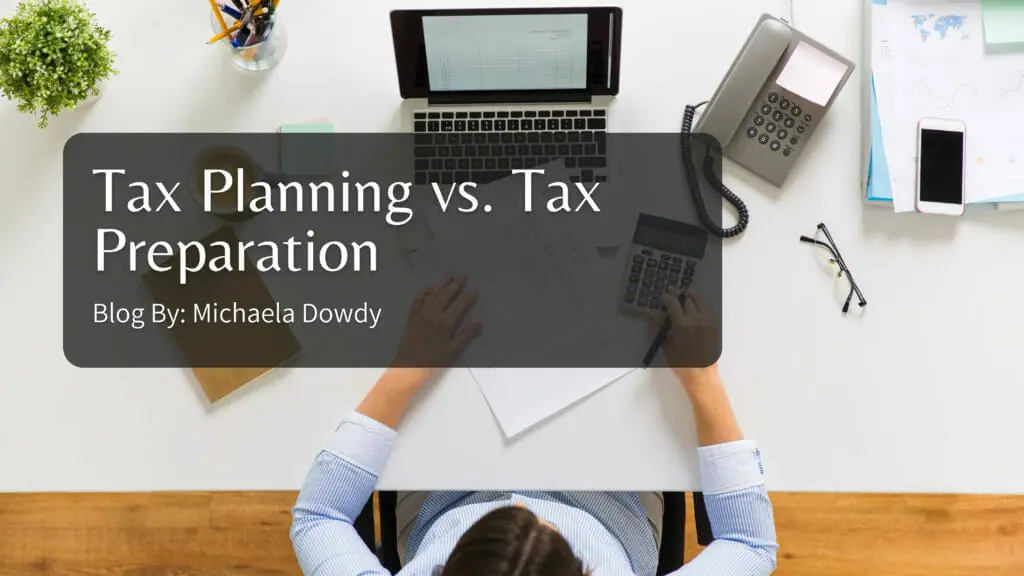Tax Planning vs. Tax Preparation

Let’s talk about taxes. “But it’s only July,” you might say. Actually, late summer—before the busyness of back to school or football season or the holidays—is a great time to consider your tax situation. Did you know that the top 20% of earners in the U.S. paid 69% of all federal taxes, with the top 1% paying more than 43%? You may or may not be in the top 20% of earners, but your tax liability still plays a big role in your overall financial picture.
As of April 25, 2022, the average tax refund for 2021 was $3,102 which is over $300 more than 2020. Did you see an increase in your refund this year? If not, you might want to consider whether or not you have maximized your tax situation with a tax planner. Often, people conflate tax preparation with tax planning. In this blog, we will unpack how you can best utilize both tax preparation and tax planning to successfully reach your financial goals.
Tax Preparation
Tax preparation is, just that, preparing taxes to be filed. A tax preparer is someone who assists others in filing their taxes with state and federal governments. This can be similar to the services of H&R Block personnel or that of a Certified Public Accountant. You will utilize a tax preparer during “tax season” which is January to April (or September to October if filing with an extension). Some CPAs and tax personnel do offer great advice to optimize tax expenditures, but that is a seldom few. Many preparers are trained for tax compliance only. Their primary objective is to protect you from the IRS by ensuring that everything is filed correctly to avoid disputes.
Tax Planning
Tax planning, on the other hand, should be done in the months prior to the end of the calendar year. Typically, tax planning is done alongside financial planning because your overall financial goals should guide your tax strategy. For instance, paying the least amount of tax may not be the best strategy for every situation. In the years between retiring and taking social security, you could have no or low income, and this could be a great time to convert IRA funds to a Roth IRA. You will pay the lowest tax compared to your future years. After conversion, the funds will grow tax free. For those still working, it may not be best idea to fund your 401k entirely as a pre-tax contribution. You might actually benefit from putting at least half your savings into a Roth 401k option. These are just a couple of examples of the options to consider when discussing your financial situation and goals. Typically, tax planning works best when a financial advisor and CPA work together. At Wiser, we have tax planning software that help us facilitate the tax planning conversation with our clients.
Tax preparation and tax planning are two unique services that you can utilize to best leverage your financial success. Take advantage of these later summer months to look into finding a tax preparer and/or planner that can best help you optimize your tax situation for 2022. At Wiser Wealth, we proudly offer tax planning within our financial planning process; however, we refer out of our office for tax preparation.
Have more questions? Contact Us
Michaela Dowdy
Financial Planning Associate
Share This Story, Choose Your Platform!
Wiser Wealth Management, Inc (“Wiser Wealth”) is a registered investment adviser with the U.S. Securities and Exchange Commission (SEC). As a registered investment adviser, Wiser Wealth and its employees are subject to various rules, filings, and requirements. You can visit the SEC’s website here to obtain further information on our firm or investment adviser’s registration.
Wiser Wealth’s website provides general information regarding our business along with access to additional investment related information, various financial calculators, and external / third party links. Material presented on this website is believed to be from reliable sources and is meant for informational purposes only. Wiser Wealth does not endorse or accept responsibility for the content of any third-party website and is not affiliated with any third-party website or social media page. Wiser Wealth does not expressly or implicitly adopt or endorse any of the expressions, opinions or content posted by third party websites or on social media pages. While Wiser Wealth uses reasonable efforts to obtain information from sources it believes to be reliable, we make no representation that the information or opinions contained in our publications are accurate, reliable, or complete.
To the extent that you utilize any financial calculators or links in our website, you acknowledge and understand that the information provided to you should not be construed as personal investment advice from Wiser Wealth or any of its investment professionals. Advice provided by Wiser Wealth is given only within the context of our contractual agreement with the client. Wiser Wealth does not offer legal, accounting or tax advice. Consult your own attorney, accountant, and other professionals for these services.





